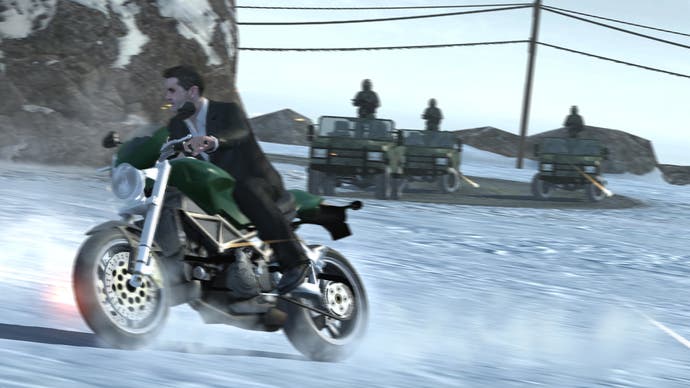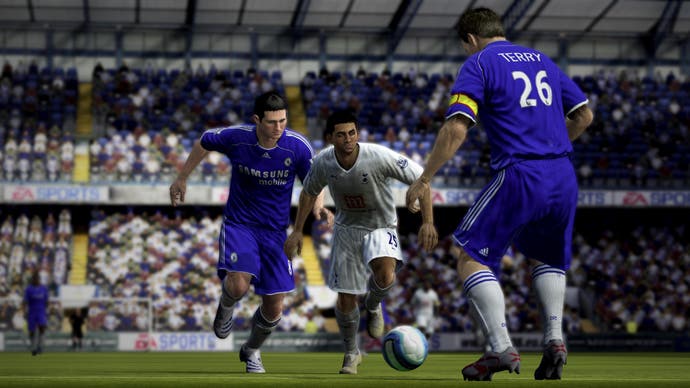GamesIndustry.biz Editorial - A Question of Size
Growing pains for publishers.
Published as part of our sister-site GamesIndustry.biz' widely-read weekly newsletter, the GamesIndustry.biz Editorial offers analysis of one of the issues weighing on the minds of the people at the top of the games business. It appears on Eurogamer the weekend after it goes out to GI.biz newsletter subscribers.
It's not terribly long since THQ looked like one of the best growth prospects in the publishing sector. With a new commitment to quality, a determination to build new IP and a strong pool of publishing and management talent, the company's stock was cautiously tipped as a grower - and it's certainly not an assessment I'd have disagreed with. The acrimonious divisions that developed between the publisher and the WWE wrestling body from whom many of its successful franchises had been licensed seemed to have been a wake-up call for THQ regarding its reliance on externally owned IP, and the future looked bright.
Now, I remain a firm believer in THQ's abilities as a publisher - and I think that games like S.T.A.L.K.E.R. and Company of Heroes have done a great deal to boost the value of the brand among gamers. By no means is it time to start writing obituaries for the firm. However, it's tough to spin this week's news in a positive light.
THQ has been forced to can a pair of racing franchises - Juiced and Stuntman, both of which the firm acquired from other publishers with a view to expanding its market share in racing - alongside a pair of unannounced titles, the PS3 SKU of the upcoming Frontlines title, and the PS2 SKU of the new Destroy All Humans game. In total, the firm expects to suck in around USD 27 million in charges related to the cancellations - and to close an entire studio, Concrete Games, which was working on an unannounced title.

It's tempting to see this as a crisis for THQ, which has also just downgraded its Q4 expectations due to game delays, and reported the underperformance of licensed titles Ratatouille and Conan. However, a wider view reveals that it's not just THQ that's facing trouble. This malaise extends to almost every mid-range publisher in the market.
Tomb Raider publisher Eidos is perhaps the most high profile victim in recent weeks. Talks with a takeover suitor collapsed, and with it the firm's value on the stock market, followed promptly by the resignation of the company's top management. It's worth noting that the management themselves only arrived at Eidos after a takeover, having manoeuvred plucky British publisher SCi into position to take over its larger rival only a few years ago.
One company regularly mentioned as a potential Eidos suitor is Midway - another mid-level publisher, big enough to run franchises like Unreal Tournament and John Woo's Stranglehold, but unlikely to give the big boys of the market any headaches in the near future. Midway, too, is struggling to some extent; it hasn't posted a profit since 1999, and has had to rethink its publishing strategy for 2008 in the face of the weak reception for its recent titles.
These companies are the publishing B-list - they sit somewhere behind Electronic Arts, Ubisoft and their ilk, but have well-established sales, distribution and marketing operations, strong relationships with buyers and media, and enough muscle to sign promising titles from top developers. So what's going wrong?
Well, in each instance, there's a rather different set of factors contributing to the individual problems of that publisher - but I think those problems may, to some extent, be symptomatic of a change which is being forced into the industry by the next generation transition. Put simply, as games get more expensive for developers, publishers and consumers alike, the challenges of managing huge teams and huge budgets mount up - and it gets increasingly hard for a mid-level company to compete with the industry's giants on a level playing field.
This happens to every media sector at some point in their history. How many big film distributors are there? Break it down by removing the child companies (such as Columbia Tristar and MGM, both of which belong to Sony Pictures) and you end up with about five or six corporations controlling the lion's share of the market. Music is even more centralised - what was once a thriving market of small publishers has been centralised into four major corporations.

The cost and risk of being involved in the games business took a huge step up when the Xbox 360 and PS3 arrived, and the problems faced by mid-level publishers could be the early symptoms of a major storm that will only be weathered by firms with sufficient scale to survive.
Big companies face problems with being nimble and able to react, and they often have difficulty controlling their costs - just ask EA, whose development costs have grown at a rate far faster than its revenues in recent years. However, they can also offer better deals for developers, better incentives for distributors and retailers, and more lavish PR to attract media coverage. They can better afford to take risks, can more readily absorb losses from unsuccessful products, and their promise of higher salaries, better benefits and more job security often attracts the cream of the crop in terms of staff.
Such advantages spell problems for mid-level companies - and they certainly make it foolhardy to try and compete on a level playing field against them. Witness how badly Take Two was stung when it tried to challenge EA's dominance of sports titles a couple of years ago. THQ's attempt to hurl its racing franchises against the might of Burnout and Need for Speed hasn't resulted in such a public defeat, but it's unlikely to sting any less for that.
What can smaller firms do, faced with this situation? They have, I suspect, two options in front of them. They can do what small companies in music and movies do, and focus their efforts on original IP and niche markets - taking risks on artistic products that could win a discerning audience, or focusing on titles with a proven market that's too small for EA to bother with.
The second option is, perhaps, more attractive - but might be even harder to implement. That option is to get bigger, and the only way to do that quickly is through mergers and acquisitions. Activision Blizzard isn't the first merged firm to be created to try and achieve scale in this market, and we doubt it'll be the last - and for the likes of THQ, Midway and Eidos, deals like that could be crucial to their future survival.
It's unlikely that any of the people who run mid-range publishers are unaware of these pressures. Backroom discussions about mergers or direction changes are undoubtedly ongoing at most of them right now. The questions I'm wondering about is whether 2008 will be the year of industry mergers and acquisitions; and if not, whether 2009 will be too little, too late.
For more views on the industry and to keep up to date with news relevant to the games business, read GamesIndustry.biz. You can sign up to the newsletter and receive the GamesIndustry.biz Editorial directly each Thursday afternoon.

